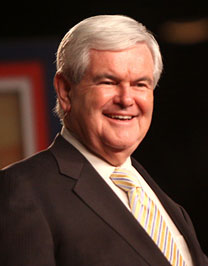![]() As the conservative resurgence continued into the 1990s, conservative Republicans criticized "big government," claiming the federal government was too big, controlling, and wasteful. Conservative leaders opposed liberal ideas and instead emphasized traditional and patriotic values. Scroll over each of the images below and learn more about the 1990s.
As the conservative resurgence continued into the 1990s, conservative Republicans criticized "big government," claiming the federal government was too big, controlling, and wasteful. Conservative leaders opposed liberal ideas and instead emphasized traditional and patriotic values. Scroll over each of the images below and learn more about the 1990s.
Politically speaking, the 1990s began with the presidency of Republican George H. W. Bush, who had previously served as vice president during the Reagan administration. The conservatives continued to push for public policies that reflected traditional values.
In the 1992 presidential election, Democrat Bill Clinton defeated President Bush, initiating a period of less conservative public policies and lawmakers. The conservatives, however, received an opportunity to flourish once again. The midterm elections of 1994, known as the “Republican Revolution,” resulted in a flood of newly-elected Republican lawmakers who gained control of both the House of Representatives and the Senate. Newt Gingrich, a Republican member of the House from Georgia, was elected as Speaker of the House.

Source: Newt Gingrich by Gage Skidmore 3, Gage Skidmore, Wikipedia
During the 1994 election campaign, several Republican lawmakers, including Gingrich, drafted the Contract with America, a list of 10 proposed acts that the Republicans would implement if they gained control of the House of Representatives. The contract was signed September 27, 1994, and would be implemented the first hundred days of Congress if the Republicans gained control. The Republican Revolution allowed them that chance.
Read the excerpt from the Contract with America, which details the bills that Republicans submitted to Congress.
![]() On September 27, 1994, Republican Congressman John Boehner of Ohio outlined the Contract with America in a speech to members of the House of Representatives. Watch the video below.
On September 27, 1994, Republican Congressman John Boehner of Ohio outlined the Contract with America in a speech to members of the House of Representatives. Watch the video below.
Source: Contract with America, C-Span
Click on the link below to see the full text of the Contract with America.
![]() Newt Gingrich first introduced the Contract with America in a speech before Congress made on September 22, 1994. In the activity below, quotes from Gingrich’s speech will appear. Read the quote and click the space that corresponds to the correct bill from the Contract with America.
Newt Gingrich first introduced the Contract with America in a speech before Congress made on September 22, 1994. In the activity below, quotes from Gingrich’s speech will appear. Read the quote and click the space that corresponds to the correct bill from the Contract with America.
When the bills listed in the Contract with America were proposed, the House of Representatives passed most of them, but the Senate did not. Only a few of the bills became law. Gingrich went on to become one of the most controversial Speakers of the House. He clashed with Clinton over many issues, including federal budget cuts, which eventually led to the shutdown of the government.
Gingrich’s refusal to compromise with Clinton eventually caused his popularity to wane, and when he pushed for Clinton’s impeachment during the White House intern scandal, the American public turned on him. Also growing tired of his tactics were his fellow Republicans, who also turned against him. In November 1998, Gingrich gave up his role as Speaker of the House. He resigned from his seat in the House of Representatives several months later.
In this lesson, you examined five crucial values of democracy as described by Alexis de Tocqueville. You also learned about the conservative resurgence of the 1980s and 1990s, including groups and individuals who worked to restore the traditional values of America.